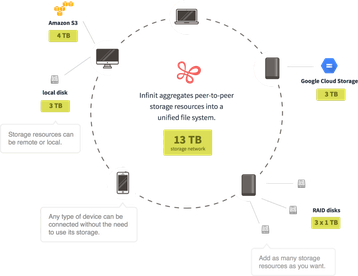Infinit, a French startup, has launched its second product, a decentralized file storage platform, making it possible to aggregate storage resources across on-premise servers and the cloud into a secure, fault-tolerant and scalable file system.
In aggregating multiple storage resources, including the public cloud (Amazon Web Services, Google Cloud Storage, etc.), local servers, computers, network attached storage and virtually any other device, Infinit provides transparency to IT managers regarding the location of the data stored while offering a POSIX-compliant file system interface.
IT managers can use Infinit’s command-line tools for monitoring and administering their infrastructure, which evolves according to modifications such as load changes, failures, the number of users, the location of nodes and other parameters.
The company’s market is heterogeneous storage environments ranging from the consolidation of several Network Attached Storage (NAS) systems and geo-replication for multi-site businesses to the creation of hybrid cloud storage environments for enterprises. These organizations can, therefore benefit from cost reductions if they choose to use the cloud, according to Infinit, without putting their data at risk.
The building blocks of Infinit life
Because of the increasing demand for secure storage solutions, files stored on an Infinit file system are split into small blocks, which are then encrypted locally using a unique key before it is distributed across the pre-defined storage infrastructure.
When a user accesses a file, the file is reassembled on the user’s computer by downloading the composing blocks from multiple sources in parallel, hence providing performance gains, meaning that audio and video can is streamed.
This approach to storage makes for a fault-tolerant system. IT managers can set a replication factor to ensure redundancy across the storage infrastructure. Should a server fail, the system automatically detects the issue and heals itself by reproducing missing replicas and rebalancing blocks between the storage nodes. Unlike existing systems, the infrastructure is managed in a totally decentralized way. Infinit does without metadata servers, avoiding bottlenecks and single points of failure.
Infinit’s goal is to disrupt legacy storage solutions from companies like NetApp and EMC that rely on a model of locking-in customers with expensive and unscalable vendor-specific hardware. In contrast, Infinit is a software-defined solution that makes the product entirely hardware agnostic, with the potential to reduce the total cost of ownership for a storage system by more than 70 percent.
If this approach is successful and adaptable to any company’s storage needs and policies, it is will also drastically reduces the costs, setup time and complexity associated with adopting a custom storage solution. Because Infinit is an all-in-one solution, it combines traditional products from a conventional storage platform and a backup system to a cloud gateway (multi-cloud) and a high-availability solution, like Veeam.
Infinit claims that it can deploy a sophisticated storage infrastructure ranging from particular, on-premise configurations to public or hybrid clouds in a matter of just a few hours.
Users that rely heavily on NAS or internal servers are now able to consolidate quickly their storage into one logical volume, rather than to interact with several, individual devices that are treated independently.
Infinit’s first corporate customers adopted the solution because of advantages in aggregating on-premise servers across multiple geographic locations. Infinit replicates data between sites meaning employees are guaranteed access to the same files regardless of their location. IT managers also benefit from an extra layer of security in Infiniti’s client-side encryption, which transfers data and has encryption-at-rest once the data is stored in the file system.

